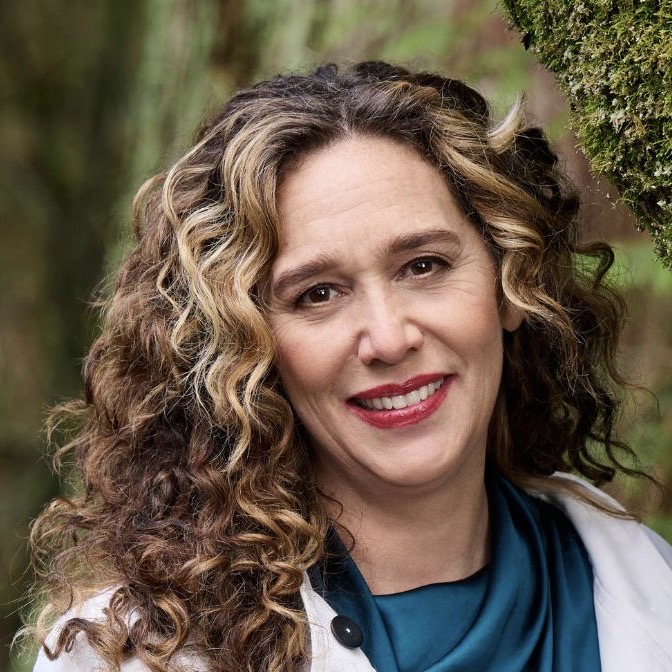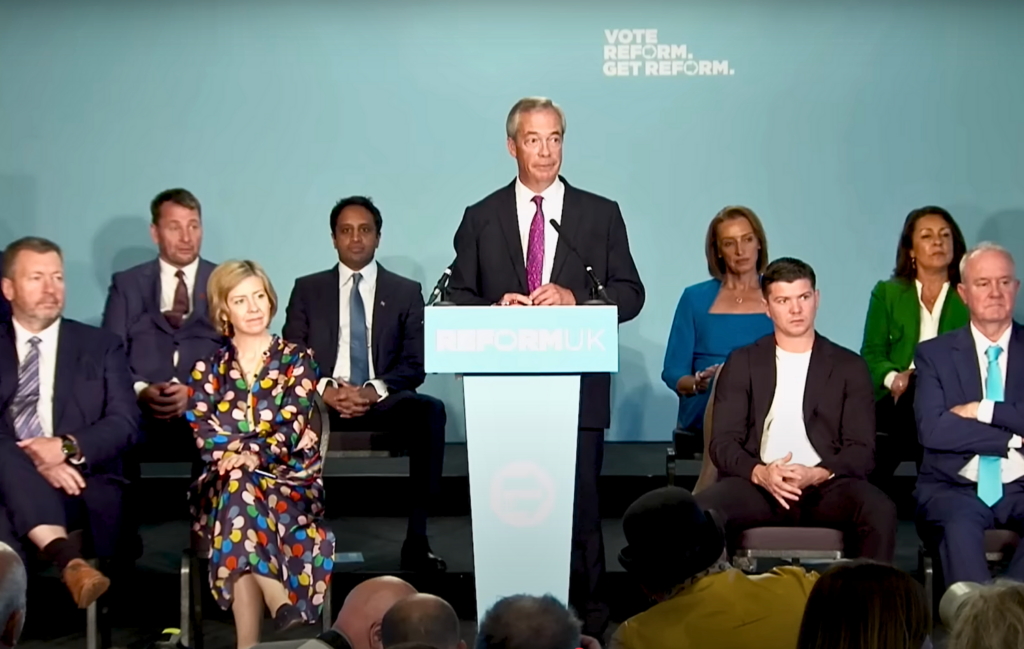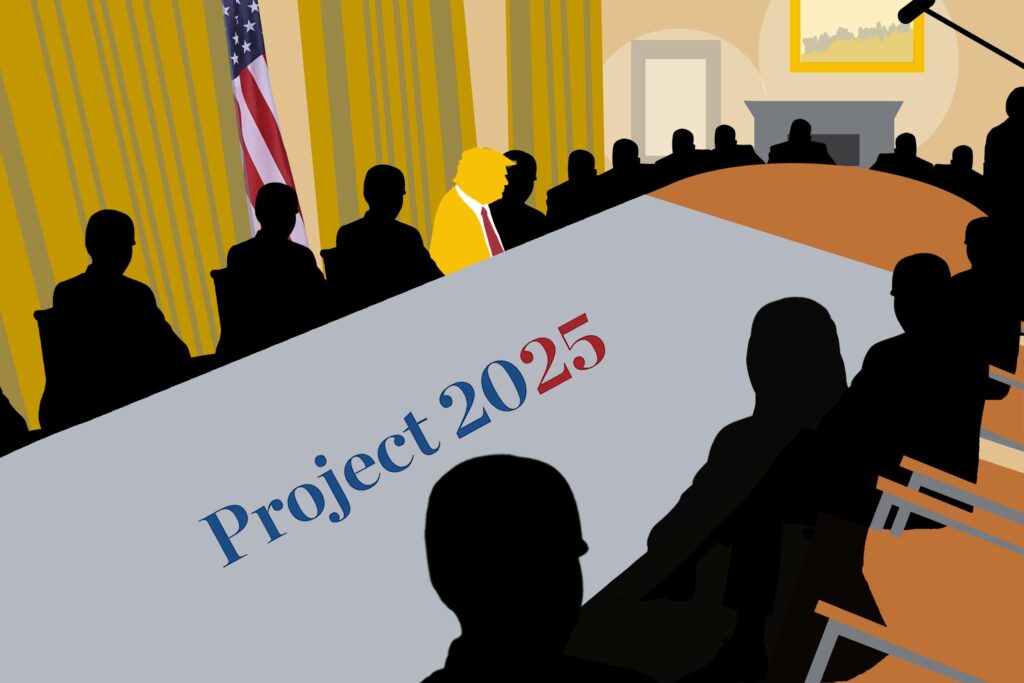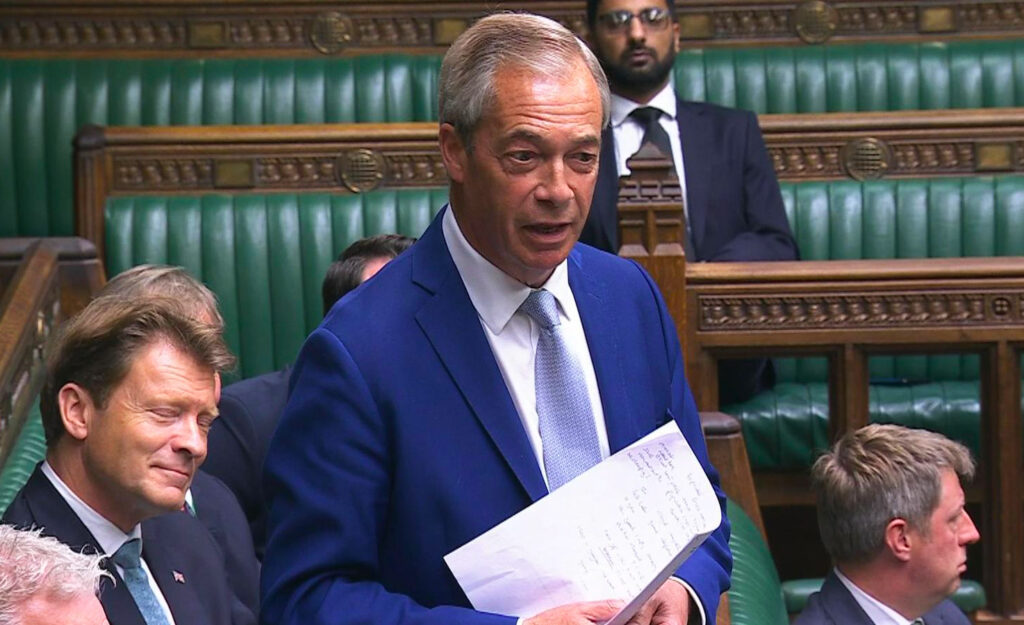To watch a video version of this interview, please register for the Climate Consciousness Summit 2024, staged by the Pocket Project in partnership with DeSmog.
Could the world negotiate a wind-down of the fossil fuel industry — just as Cold War adversaries once agreed to limit their stockpiles of nuclear weapons?
In an interview for the Climate Consciousness Summit 2024, Tzeporah Berman, founder and chair of the Fossil Fuel Non-Proliferation Treaty Initiative said a growing wave of support for the proposal — which has been endorsed by more than 3,000 scientists, 121 cities and sub-national governments, and 14 nations — could ultimately make new fossil fuel projects unacceptable, even in the United States, the world’s biggest producer of oil and gas.
“I would say this is a moment in history where we need bold new ideas,” said Berman, who is also International Program Director at Stand.Earth. “This is a bold new idea, and we can’t afford to not try it.”
Berman, who was named last week as one of TIME’s hundred most influential climate leaders in business in 2024, also spoke about the need to combat the pervasive influence of fossil fuel advertising — which had “stolen our imagination” to envisage a world run on clean energy; the new perspectives she has gained from working with Indigenous elders in the Amazon; the importance of arts and culture for the climate movement; and how connecting with nature has helped sustain her 30 years of environmental activism in her native Canada and around the world.
To watch the video, please register for the Climate Consciousness Summit 2024, staged by the Pocket Project in partnership with DeSmog, here. The following is an abridged transcript, lightly edited for clarity.
Matthew Green: Why did you decide to take the route of advocating for a Fossil Fuel Treaty?
Tzeporah Berman: It grew for me out of my work in the oil sands, also known as tar sands, in Alberta. I worked for several years both in advocacy and with Indigenous peoples trying to stop the expansion of the tar sands and the trillion litres of toxic tailing ponds in the centre of Canada. It’s the single largest industrial project on Earth. The devastation is hard to imagine if you’ve never been there, and it’s poisoning people and land.
And it’s also the primary reason that Canada has been missing our climate targets year after year, performing worst in the G20. Because even though Canada has done a lot of really progressive things on zero emission vehicles, or a national carbon tax, we keep growing the oil and gas sector, and the emissions domestically just from that production are now 31 percent of Canada’s emissions.
And it took me a while to realize that no-one considered constraining production of the products that are causing the problem as climate policy. And even when we had progressive governments come into place like [Prime Minister Justin] Trudeau, the idea was that we do emissions targets, we do demand-side measures, but we don’t constrain production. The markets will do that, that’s not our problem.
But of course, the markets aren’t constraining production, because the markets are distorted by the $7-8 trillion the IMF says were given in fossil fuel subsidies last year; that’s $13 million a minute. These are the most powerful companies on Earth, and most profitable companies on Earth, and they continue to hold influence so that they can grow and expand their products. And so I started looking around the world and saying, “Okay, where are there good examples of people actually addressing this issue?”
And I found in Norway, Argentina, the UK, everywhere I went, everyone I met with was dealing with the exact same issues. And I’ll never forget the day that I searched the Paris Agreement, trying to understand how does the Paris Agreement constrain production? And I found out that the Paris Agreement doesn’t even include the words “oil, gas or coal.” Before the interim text last year talking about a fossil fuel phase-out, which we finally won [at COP28] in Dubai, it didn’t even include the words “fossil fuels.” And that’s not by mistake. The fossil fuel industry has tried to make this our problem, “You use it, we just produce it. We should keep getting to produce it.”
And they’ve influenced climate negotiations and climate policy for 30 years to such an extent that even climate leaders believed that constraining production, stopping infrastructure, pipelines, new [Liquefied Natural Gas] terminals, was not a climate issue.
Even President Biden, with the IRA [Inflation Reduction Act], an incredible piece of legislation on a lot of fronts on climate, encouraged increased production. And now, of course, the U.S. has become the largest producer of oil and gas.
And so I set about to try and learn how society has addressed issues like this before, with intransigent products. And when you look at the Montreal Protocol that bans CFCs, or the Nuclear Non-Proliferation Treaty, land mines, chemical weapons bans, you find that it always took international cooperation. It always took first-mover countries acknowledging the science and acknowledging that we need to stop the expansion of the bad stuff in order to build the world that we want. And it was on that very simple principle, inspired by a declaration that came out of the South Pacific, called the Suva Declaration [on climate change], that island nations came together and said, “No, we need a moratorium on fossil fuels.” So we developed the Fossil Fuel Non-Proliferation Treaty, the three pillars roughly modelled after the Nuclear Non-Proliferation Treaty.
Firstly, countries need to cooperate to stop expansion of production. And that’s in line with what the International Energy Agency and the Intergovernmental Panel on Climate Change have all said: no new projects fit if we’re going to meet Paris goals.
Secondly, manage a wind-down — who gets to produce, and how much. We have enough oil, gas and coal in existing fields that are already producing, or product that’s on the surface of the planet, that if we burned it today, it would take us past two degrees. And in fact, the UN Production Gap Report shows that we are on track, right now, to produce 110 percent more oil, gas and coal by 2030 than we can ever burn if we want to stay below 1.5. So we have to manage who gets to produce and how much, and there has to be equity and fairness in that.
There are some countries that are digging for more coal, or drilling for more oil, just to feed their debt, like Ecuador, in the heart of the Amazon. So we need debt relief. We need to do trade agreements. We need to do tax agreements.
And then the third pillar is to fast track the Just Transition. How do we support that in those countries? What kind of finance agreements are going to be made?
Five years ago, we started working on it in earnest. That year we brought together diplomats and lawyers from around the world now and it’s a global movement. We have 3,600 organizations that have endorsed [the treaty] in 117 countries, and the campaign is active in about 50 countries now. And now 14 nation states have endorsed and started to form a bloc of countries that will in the next year, we believe, begin negotiations on a Fossil Fuel Treaty that would be a companion to the Paris Agreement.
Green: What do you say to people who think, ”That sounds like a great idea in theory, but with the way the geopolitics are, it’s just out of reach.”
Berman: I would say three things. First of all, I think the fossil fuel industry has stolen our imagination to imagine a world that is not dependent on their products, and they’ve done that through billions of dollars of relentless advertising throughout our whole lives.
Yesterday, I was walking down the street, there was a huge billboard that had a picture of a woman carrying groceries, saying they will be more expensive if you don’t support the oil and gas industry. They have been fear-mongering on price and scarcity for so long that it’s embedded in us that expansion of this product is what is essential for prosperity. It’s not true. The IEA says we have the technology today to reduce our dependence on fossil fuels by 50 percent by 2030.
The other piece that’s really important is that sure, the US may never sign, Russia may never sign, Saudi Arabia may never sign, but we studied six other treaties, and the actual binding agreements that are made, as a group of countries form, and more countries join, starts to create advantages — trade agreements and tax agreements — that other people want to become a part of. That creates a wave. But most importantly, it creates a social norm where it becomes unacceptable to be stockpiling nuclear weapons.
We’ve had over 3,000 scientists; 101 Nobel laureates [support the treaty] — and over 114 cities from all around the world, in every continent. Building that wave of people saying, “No, we don’t want this. We don’t need this, and it’s hurting us to expand it” is part of shifting that social norm that’s going to make it unacceptable in foreign policy for any government, even President Trump, to be announcing new projects
If enough countries are saying, “We know we’re going to buy some [coal, oil and gas] between now and 2050, but we’re only going to buy from countries that have endorsed the Fossil Fuel Treaty because we know that their production is on a wind down, in line with a safe planet,” well, that creates market access issues.
And then finally, I would say this is a moment in history where we need bold new ideas. This is a bold new idea, and we can’t afford to not try it.
Green: It’s easy to get locked into this culturally induced trance, where it seems impossible to imagine a world that operated in a radically different way from the one we have now. And yet that is obviously what we need if we’re going to preserve a habitable planet.
Berman: I remember debating the premier of Alberta at one point when I was working in the tar sands and she said, “Tzeporah is talking about a world that is unrealistic, but here in Alberta, we don’t ride unicorns, we ride horses.” It was the headline in the news the next day. She totally dusted me. But what I found fascinating about that is that she could just cast doubt on technologies that are a reality today and functioning well in several countries.
Electric vehicles are growing quickly. They are faster, they are cleaner, they are better, but still there are the myths in our society, the fear – the influence on our psyches has been significant.
And if you dig into some of the work of someone like InfluenceMap, you start to see why. Because these companies have spent decades infiltrating our consciousness, from sponsoring our Rides for Cancer and our museums, to funnelling money into universities, to being one of the largest blocs of people at the climate negotiations; let alone the relentless advertising. They have taken away our ability to think past our dependence on them, and that’s exactly what they want.
Let’s not forget these are companies that have made $2.8 billion a day, every day, for the last 50 years – the most profitable companies in the history of the world. They have a lot of money to push this propaganda down our throats.
But I’ve been at this a long time, and the interesting thing for me is that the evidence — despite the fact that they’re paying for the science and infiltrating the universities – just no longer supports them, because the solutions are working, and the solution that they have proposed, which would allow them to continue production — carbon capture and storage — is failing dramatically and historically all over the world. And 80 percent of the [carbon] offsets that have been studied have been shown now to be bogus. And the idea that we can just protect forests while continuing to expand fossil fuels in a world where our forests are literally on fire is absurd.
I think — as author John Valiant said in an interview when he released his incredible book on the wildfires in Alberta — “We’re falling out of thrall with Big Oil.” And I think we’re seeing that happen from the lawsuits against the oil industry by states and cities now; from the number of cultural institutions saying they’ll no longer take their money; to divestment; to the research that we’re now seeing. I think we are building up our evidence, but what clearly remains to be seen, especially after [US presidential elections] last night, is how to shift the popular conversation so people feel safe, people have confidence in alternatives, especially in a world with increasing economic inequality.
Green: You spoke about the evidence and persuading people rationally. But how do we open people’s hearts?
Berman: I’ve thought a lot about this in the last year. I started working again with one of my great mentors and heroes, Kumi Naidoo, who, many will know, was the secretary-general of Amnesty International, secretary-general of Civicus, executive director of Greenpeace International, a social justice activist in South Africa against apartheid since he was 15 years old. An incredible, incredible man, and he just announced that he has now become global, president of the fossil fuel treaty, and I’m just thrilled.
He took a couple of years sabbatical after the death of his son, and started doing some soul searching about why we’re failing in the climate movement. And he called me last summer and said, “I think we forgot that other social movements — when I think back to my days in the apartheid movement — other social movements spent just as much time, if not more, opening people’s hearts.” Arts and culture and music as messengers were supported as part of the movement. They were critical.
And the climate movement grew out of policy wonks, more than many other movements. If you look at the conservation movement, it grew out of philosophers and poets, and Indigenous leaders. The climate movement grew out of number crunchers who realized early on that we were in big trouble, and started developing policy emissions targets.
All of these concepts and numbers — we’ve made it so difficult for people to engage. Our job is to build power, to build movements, to make the tent bigger, and to do that, we need to open people’s hearts. So simultaneously to starting to talk with Kumi, I had started talking with allies in the South Pacific, from Samoa, Vanuatu, Tuvalu, Fiji and New Zealand — artists who had come together to support the Fossil Fuel Treaty.
Because their stories are not just about their islands literally sinking underwater and being battered by cyclones. Their stories are about their ancestry and their history and how the project of colonization is intimately connected to what we’re seeing now in climate change. And they formed a group called This Is Our Home, and for the past couple of months, I’ve been touring with them. I just got back from Samoa, from the Commonwealth Heads of Government Meeting, and they were also in New York. And when those people sing about their home and about climate change, there’s not a dry eye in the room. And when they sing one of their upbeat songs, everyone’s up, and you can feel in a room this sense of joy and common purpose.
And I watched it happen at the Commonwealth Heads of Government Meeting, where there had been all these rancorous debates and then This Is Our Home played, and it was this ball of love. And the conversations afterwards were different: People were listening to each other. And so I’m newly inspired by the work of trying to bring arts and culture into the climate movement to support these artists who say it a different way. One of them, his name’s Junior — he’s a very well known artist in the South Pacific, said to me, “Your job is to change people’s minds. Your job is to speak to their head, but our job is to speak to their heart and open them so that they can hear you,” and I think that’s very powerful.
Green: There’s something about creating these kind of coherent group fields that allow us to download a new future.
Berman: There are two other things that I’m drawing strength from, to get up every morning and do this work.
One is — and it sounds romanticized, but it’s not — is the wisdom of Indigenous peoples around the world. I have had the tremendous opportunity over the last couple of years to spend quite a bit of time with Indigenous nations from northern Canada, from the tar sands, to the Kichwa and the Achuar and Waorani in the Amazon, and it has it has struck me just how the project of colonization has taken this knowledge, these voices, and either romanticized it so it’s some kind of caricature, or completely ignored it.
And that’s at the core of what all of the Indigenous nations that I’ve been working with have been saying: their policies, their laws, their way of life, all stem from valuing life, from recognizing our dependency on living systems. When you look at our economic system, clean air, clean water doesn’t factor — we have disassociated ourselves so far from basic human needs, and our tremendous fragility as one species on this planet.
I was in the heart of the Amazon in a very small village, and I was strategizing with a number of Indigenous leaders on how to stop oil development in the Amazon in Ecuador. And late in the night, we’re having tea, and I was sitting with one of the elders, a shaman, And he had recently gotten a computer and Wi-Fi and a solar panel, and he turned to me, and he said, through two interpreters, “I’ve been studying your people, and I’d like to ask you a question. Is it true that your whole society defines wealth based on this paper money that you’ve created?”
And it was just one of those moments in my life that I will never forget, because the question was so simple, and it also rocked so many of my ideas of who I was and what I was doing there, and who they were.
And I said, “Yes, that’s true. Tell me how you define wealth.” And he said, “Well, it’s very simple. We define wealth as love, a strong community, and a healthy forest that brings us our air and water and food and medicine.”
And their life philosophies, their plans, their everything, all stem from those three things. And in a lot of ways, for someone who’s very heady, who spent a lot of time in university studying economic theory and political theory, it was just a moment where everything just kind of ground to a halt, and then shifted into place for me.
And thirdly, time in nature — when we have times like last night in the U.S. election, or we hear about another fossil fuel mega-project being approved; or another flood in Spain; or fire in Canada — the only way I can pick myself back up is to go to the forest or the beach and spend time in nature, to recognize the awe and beauty and majesty of nature, to feel a part of it, to feel the energy running beneath your feet and beneath your fingertips, to recognize how little we know and understand of its functioning.
Somehow it takes away the ego, all the hubris. It just makes me realize that I can do my part, and I need to do it well, and that I’m part of this much larger ecosystem and consciousness.
It also makes me feel this tremendous responsibility. For a while it was crushing, until I actually spent time meditating, and in nature, and I started realizing instead that it was a gift that gives me my place and my sense of purpose. And I can’t hold it all. None of us hold it all.
Green: You’ve also been meditating with monks?
Berman: I was very lucky to be invited by [former UN climate chief] Christiana Figueres and the monks of Plum Village several years ago to go to Plum Village in France, and I’ve since worked with them a number of times.
They have online courses now, and they’re doing retreats all over the world, Zen and the Art of Saving the Planet.
It really changed me. It kind of slowed my revving down. It forced me to think deeper, and also to find space and clarity and to be grounded, not just in the time I spent every day meditating, but in moments when I’m in negotiations, or I’m in a hard conversation with a prime minister or president, and I can just breathe and drop down to that feeling of spaciousness and allowing myself to let what’s going to come come, to listen to myself in a different way, and that’s been tremendously useful for me.
When Thích Nhất Hạnh passed away, he asked the monks of Plum Village to continue his practice of engaged Buddhism by reaching out to climate leaders, because the world was going to need us, and we needed resiliency. And I think that’s true, whether you find it in meditation or in nature, or in the incredible trauma work that you’re doing with the Pocket Project, I think being able to go deep into despair and grief, to find resiliency, to find a groundedness and sense of purpose, is absolutely essential. And I think also to find joy, to allow yourself those joyful moments, whether it’s in nature or an amazing meal with your family, or dancing in the kitchen with your kids, joy is a strategy, as author Rebecca Solnit says, and we need that to fuel these movements.
I see it fuelling the Fossil Fuel Treaty movement around the world, with faith leaders and Indigenous leaders and artists coming together to call for the world that we want, to say no to expanding the products that are killing us, and to say yes to protecting what we love. And we need to find those places, those campaigns, where we can come together, because together, we’re so much more powerful than apart.
To watch a video version of this interview, please register for the Climate Consciousness Summit 2024, staged by the Pocket Project in partnership with DeSmog.
Subscribe to our newsletter
Stay up to date with DeSmog news and alerts







